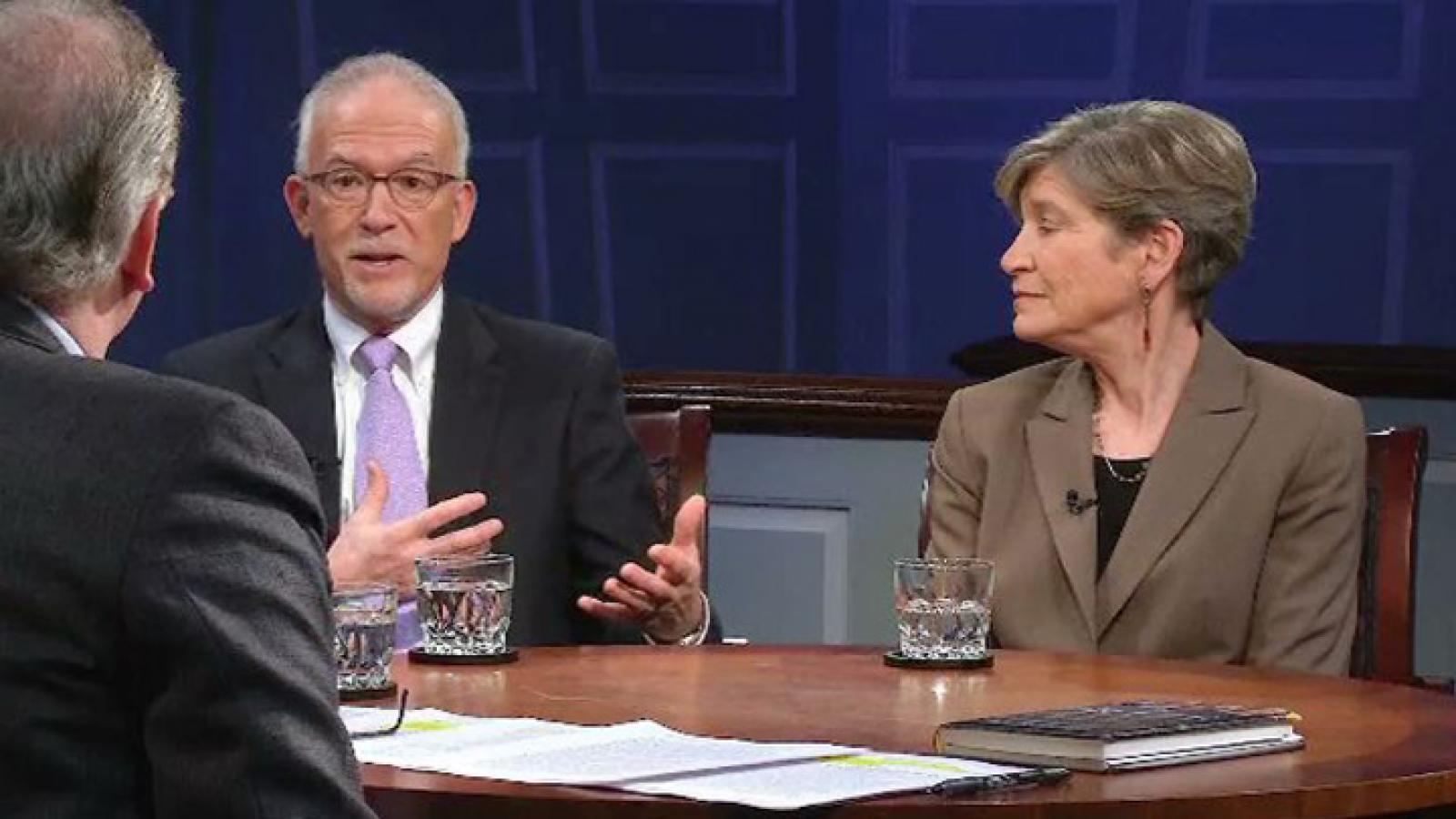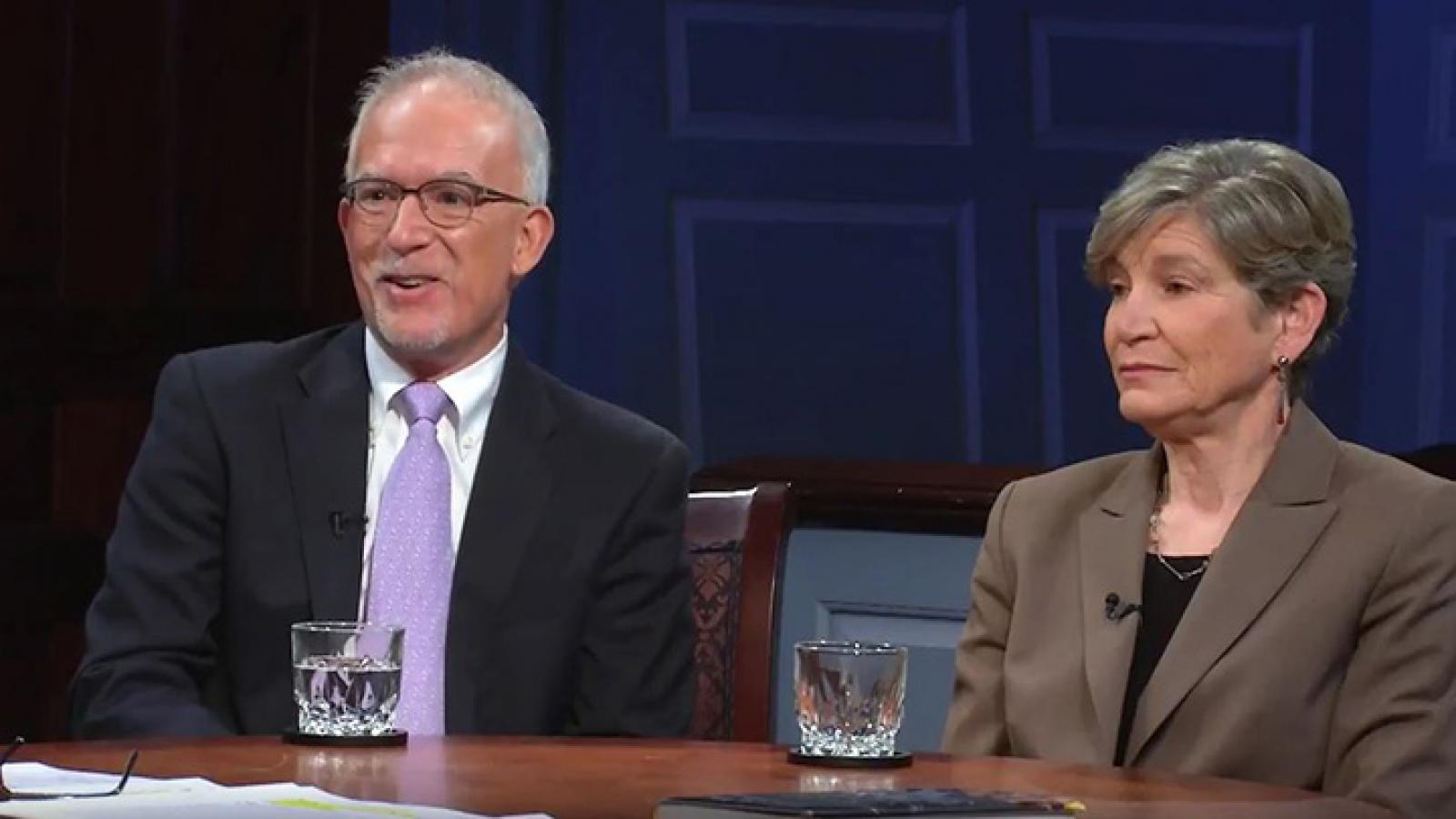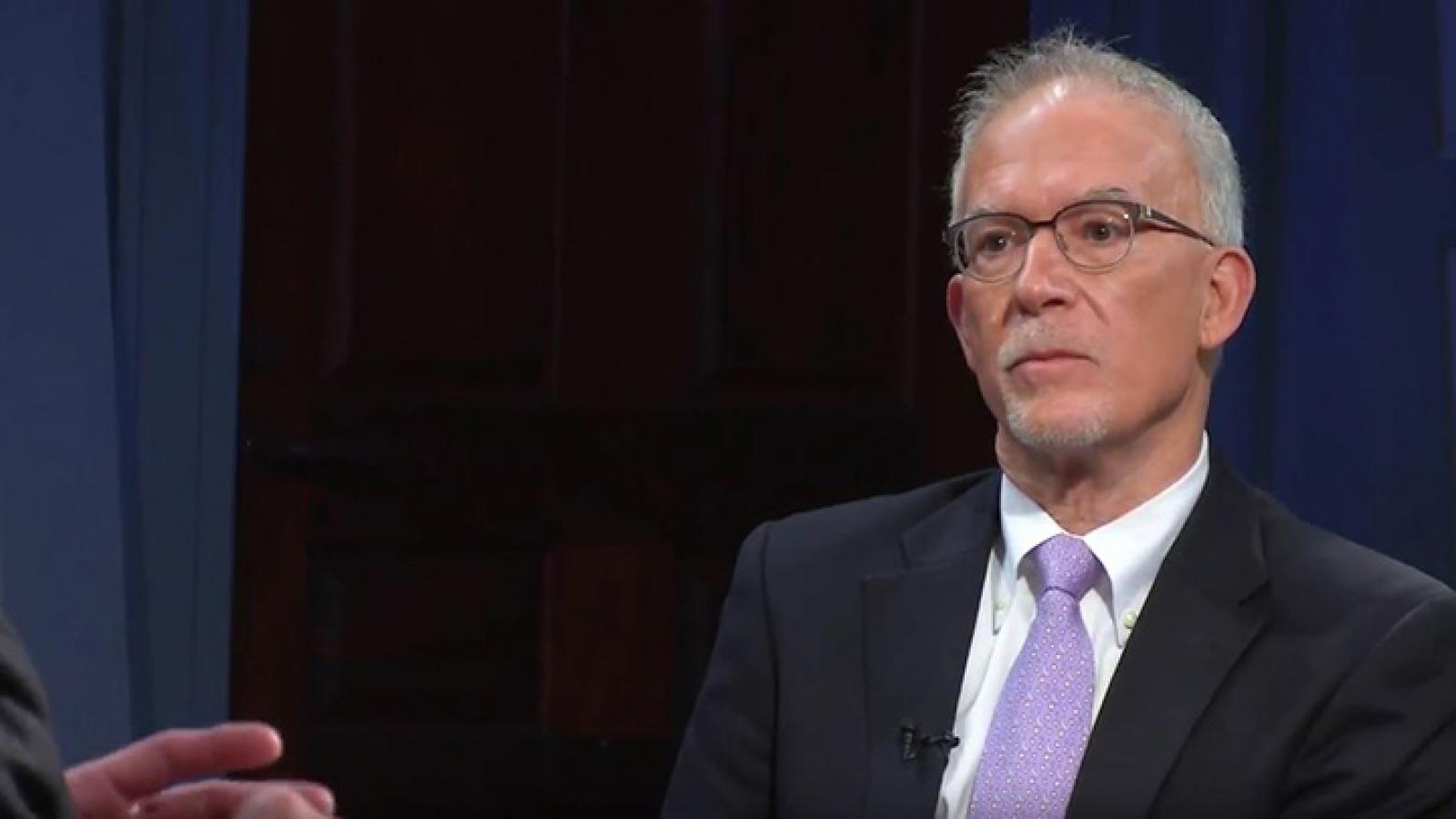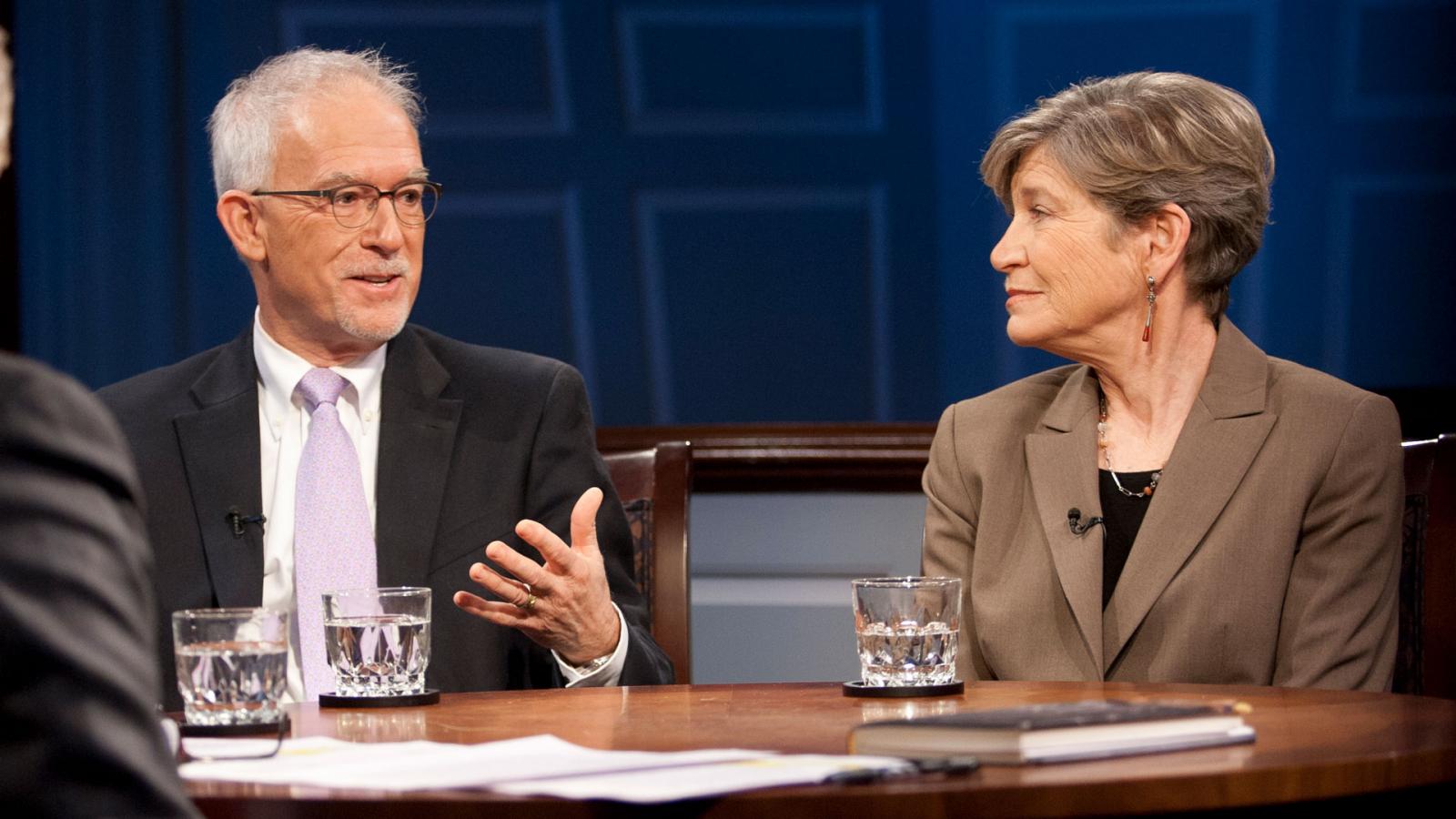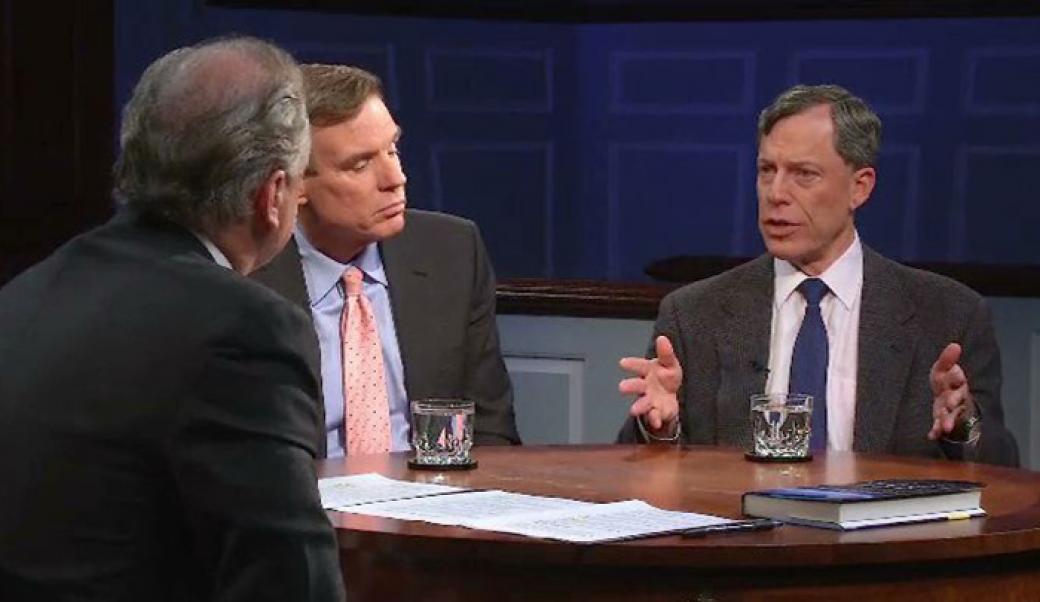About this episode
March 08, 2016
Dale Russakoff and Robert Pianta
"The Prize: Who's in Charge of America's Schools?" by Dale Russakoff, first serialized in the New Yorker, is the story of how New Jersey Governor Chris Christie, Facebook founder Mark Zuckerberg, and now U.S. Senator Corey Booker joined together in a public-private partnership to transform the failing urban public schools of Newark, N.J.—and utterly failed. Russakoff and Robert Pianta, the dean of UVA's Curry School of Education, discuss the story and what it means for the future of public education.
Transcript
00:40 Douglas Blackmon Welcome back to American Forum. We’ve all heard it a thousand times. Every president, every governor, everybody says: Public Schools are in Crisis. America is falling behind. 1.2 million kids drop out each year. The U.S. is number 36 in the world--in high school graduation rates. Teachers are terrible. Their unions are paralyzing us. No Child Left Behind was a disaster. Common Core is a conspiracy. Everything is failing. Especially for kids from poor and minority families. Yet at the same time, the average high school graduation rate in the U.S. hit 81 percent in 2015—the highest it’s ever been. Ten percent higher than a decade earlier. African-American graduation has skyrocketed over the past generation. More than doubled. The majority of teachers are not members of a union. And on close examination, those dire comparisons between 5thgrade math students in South Korea, and our kids in California, often turn out not to be quite as damning as we think. So what’s the reality: Is American Public Education Doomed, or not?
FACTOID: The Question: Is public education doomed?
Joining us to discuss that are Dale Russakoff, a former Washington Post reporter and author of The Prize: Who’s In Charge of America’s Schools, and Bob Pianta, dean of the University of Virginia’s Curry School of Education, the author of 10 books, and an expert on what makes teachers most effective in classrooms. It’s great to have you both here. It’s great to have both of you here.
02:05 Blackmon: So Dale, let’s start with you and the book that you’ve written. It is a book about big issues in American education, but it is really very focused on the narrative on something that happened in Newark, New jersey, one of the most troubled school districts in the country involving a cast of quite remarkable characters trying to pull of a public-private non-partisan partnership around an intractable problem, but briefly tell us what exactly happened in Newark?
Dale Russakoff: Well, Chris Christie, the governor of New Jersey, and who is a Republican and Corey Booker, the mayor of Newark at the time, who is a Democrat, one suburban, one urban, one African-American, one white, one Republican, one Democrat came together and thought that because the Newark schools were run by the state, they could take the entire system and turn it around from a system that was failing children at a high rate in an impoverished city and bring in a philanthropist who Mark Zuckerberg turned up and signed up for the job to fund the changes, and what they believed they could do with that kind of political power and that kind of money behind them was take five years and turn around not only Newark, but come up with a model that they could then take to every city in the country and solve the crisis of failing schools in urban education throughout America and that Mark Zuckerberg would use his, he was only 26 at the time, and he would use his fortune. . .
FACTOID: Over 29% in Neward, NJ live in poverty, versus 10% statewide
Blackmon: Made from being the founder of Facebook
Russakoff: Yes, to fund this kind of philanthropic renaissance in urban education.
Blackmon: So what happened?
Russakoff: They did not succeed, but I think that the point is they couldn’t succeed. You can’t in five years turn around a failing school district that is, that grew out of a city that has been impoverished for generations and that there were a lot of issues that, besides just the management of the schools that were wrong. They did in fact, they didn’t transform the schools, they didn’t come up with a model they could take anywhere else, but they did some things that you know, in an incremental way, have helped education in the city. The problem is that the children in the district schools, where the majority of the children still go in Newark, their scores have actually gone down in the time since this effort was started, while the charter schools, they greatly expanded the charter schools, and those students are still performing much better than average.
04:30 Blackmon: And you put this together by essentially being kind of a fly on the wall through the process. I mean as this began as a reporter and a journalist you decided to, to latch on to this and follow the process in a really intricate way, and that’s what led to the book.
FACTOID: Much of The Prize first printed in New Yorker Magazine series
Russakoff: Yes
04:44 Blackmon: Yeah which is an amazing sort of…an amazing account of the interior of that kind of a process and that sort of thing that is pretty rarely seen. But Bob, how do the things that Dale has written about in this book apply to the broadest sweep of education and education reform?
Pianta: Well I think that the book captures really well the broader tensions that exist here. You know you either have kind of a top-down, bottom up tension. Does change happen because somebody in the governor's office or mayor's decide for it to happen? Or does it happen because teachers in a local situation decide to make their school better? There's an insider-outsider dimension to it.
FACTOID: Newark District taken over by state in 1995 due to poor performance
You know again people from the outside coming in on philanthropy and then there is a sense that these problems are typically underestimated, there are easy and quick fixes that exist for these: fix teachers, you know fix leaders, have a champion leader for every school. So there is an oversimplification. I think that there is also not a real appreciation for timescale. There's no way change happens on the magnitude that it would need to happen in five years. Education is really a ground game, you know, kids acquire skills year to year to year to year and change happens in that very same way, it's incremental and needs to be directed and intentional. And I think, for the most part, the story of Newark is the story of most urban education reform situations across the country.
08:15 Blackmon: Does seem to be that these efforts, at least in my experience, I've never heard a story, like this one, that ended on a positive note about the oh this was really great and now the schools in this struggling place are radically different but have I missed that? I mean is there some successful version of this model?
Russakoff: Well, I think the issue is that, you know, people are looking for a silver bullet for a magic transformation, a five-year wonder story, and it is as Bob said, it's a ground game, it's a slow incremental process that has to build year by year and that things do transform over time, but you need people who are going to be there for a generation, not for a politician's life-cycle.
Pianta: Yeah, I think this is really a key point, because you could, you could scan the country and find examples of the mobilization of a community, the bringing in of capital from the side, whether it's philanthropic or from the business community and real movement on the part of the schools. There was a time when Long Beach, you know, California would be on that list. There are other examples of that. And then the politics change because the arch of politics runs on a different time scale. Somebody has a different set of priorities. The people who were there are no longer there and then that movement erodes. So the need for continuity here is really really high. And you're mapping that need on, you know, at least for the last decade, an economy in most communities, and these communities that has eroded and created even greater stresses and challenges for these schools to deal with.
07:51 Blackmon:What are the primary mistakes? Other than the fact that they were trying to do it too fast. But what else went wrong in this story?
Russakoff: Well, I think that the first thing that went wrong that was really almost a fatal error was that the people who were in charge of the reforms because they didn't have to have local buy-in since the state ran the schools, didn't have any community input in their strategies. So this vision on how to reform the Newark schools was originally drawn up for Mayor Booker by the McKinsey Consulting Firm and it followed the basic game plan of the education reform movement nationally which was a very oversimplified view of how you reform schools.
FACTOID: Obama signed reform bill in 2015 reducing federal control of schools
It was, you know, get rid of the bad teachers, bring in the new teachers, change the teachers’ contract so that teachers get merit bonuses based on the student test scores, not based on larger measures that now even Bill Gates, who started the accountability movement, in many ways feels you need more measures than just the test scores. So you know they had these very kind of simplified views on how to change education. And they were without, you know, the problem in Newark was that the city had a long history of feeling that change had been done to them not with them I think there was more room for collaboration than they had because of the way they approached it.
Pianta: Yeah, I think this is really an example of something, as she repeated over and over again around reform efforts that there's almost a lack of recognition or appreciation for the people and the parents primarily, but increasingly the kids, who are living these experiences in these schools and they very much want what's best for their kids and would like the schools to change and improve. They see day to day and live day to day these challenges and for people to come in from the outside and say "We're going to fix you." ultimately creates the kind of resistance that then is predicted from the folks that are coming in from the outside and these follow very predictable courses.
Russakoff: Governor Christie froze funding to all of the schools in New Jersey because of a fiscal crisis and that included Newark, and meanwhile, this reform effort was expanding charter schools, and thousands of children were leaving the district schools and going to charter schools and even children who had been outside, like in private schools or catholic schools switched into the system and went to charter school, but the way you find education for charter schools in New Jersey is that money comes first to the school district and the school district then supplies the charter with its funding per student. So Christie froze the money to the district but meanwhile, the district had to spend more and more to pay the charter. So the school district is now in a dire financial crisis
10:43 Blackmon: But I’m curious what the two of you think about charter schools and how this, because we’ve had, President Clinton was a big advocate of charter schools, President Busch was a big advocate, President Obama has said much about them, Arne Duncan, his famous Secretary of Education for most of his administration big supporter of charter schools. So there has been a kind of bipartisan positive talk about the importance of charter
FACTOID: Charter schools have grown 47% since 2006, to 6% of all students
schools, but there’s also a great deal of controversy about them. But, what’s your view? Do they work?
Pianta: On average, they’re about as good as the public schools. I mean that’s what the evidence says over and over again. Are they high performing charter schools? Sure. And there are plenty of high performing public schools as well. So I think, you know, the idea of charter schools though is a terrific one. I mean the fact that you have a sector of activity that feels like it needs movement, there’s indications that it needs movement, you want to create spaces for innovation and creativity in that so that people can bubble up ideas and drive change in certain directions.
FACTOID: 7 out of 10 Americans support publicly-funded charter schools
Charter schools were initially, that was, that was the reason, you know, that we were going to go down this road. I think it’s become more of a, it gets coopted by we want charter schools to compete with the public schools and drive the public schools out of business as Dale kind of described. And then it becomes kind of a one-upsmanship, you know, what is the best way to do this? Which I think ultimately is one reason why these reform efforts kind of fail.
Russakoff: And in Newark, though the charter schools, the largest charter school networks, which are the majority of the, have the majority of kids in them in Newark, do outperform the district schools significantly.
12:21 Blackmon: And that’s KIPP, right?
Russakoff: That’s KIPP and also a network called Uncommon Schools.
12:25Blackmon: And KIPP is a, for those who follow education reform, KIPP’s a very common name and operates schools in a lot of different places and does, does seem to have some of the better data in terms of the performance of students there.
FACTOID: KIPP is a national network of charter schools begun in 1994
And to break that down a little further just so it’s really clear, some of what you’re talking about are things like a student who has shown some promise, but then is absent for a week at a time and the teacher at the charter school, being able to for a variety of reasons including that there’s no union restriction to prevent this, that the school ends up sending a teacher or someone else out to find out what’s going on with this kid. There’s a transportation problem, and so the next thing you know, somebody from the school is picking that kid up and bringing them to school every day. That level of attention, is part of why that child begins to perform.
Pianta: And I think the other thing that sits underneath this is that, you know, charters often times have a very, the best ones, KIPP is a good example of this, have a very organized approach to instruction. You know, everybody knows what they’re working on at any given time. The teachers are very, very clear about what they’re doing with kids in the classroom and that instruction is very tightly aligned to the set of performance outcomes that they’re using to gauge their performance. And that kind of resource rich outside of the classroom and very intensive work inside the classroom, that’s the model that’s really been the most effective at moving kid’s performance in these urban districts.
13:57 Blackmon: The way you guys have been talking about charter schools here and the advantages that they seem to have in Newark is that, does that suggest that what we should do is just essentially make all public school systems charter-like? Sort of throw away all of the restrictions that are in place that prevent some of this hands-on contact. Is that where that logic goes? That that would be a better approach?
Pianta: Well I think that logic goes down the road of increasing more, even local control, in some sense. We have local control on public education and it creates even further authorization for local activity. And I think you would find that if we went down that road, what we’d find five or ten years after going down that road, is well not enough of that is performing the way we want and we need a more top-down solution. So I don’t know whether that’s the answer. It certainly seems to me that a greater proliferation of success points is going to be real important and models can be real important, but I think we will ultimately have that same dynamic of local versus a more centralized approach rearing its head.
15:11 Blackmon: And just to add a little to that. One of the other things the charter schools do allow for and that in some respects, as the case here, is a kind of venture philanthropy that someone like Zuckerberg or some other wealthy person can or a group of people can organize themselves and bring additional resources to the table. Is that an effective part of the model, you know, just waiting around for the Zuckerbergs or the Bill Gates of the world to decide to let loose of their millions and that will fix everything?
Russakoff: I don’t think that there’s any way that can be done consistently across the country or even across the urban school districts. I think that what Zuckerberg had hoped to do with his money was to create a system that would give the school district more of the freedoms that the charters had to recruit teachers from, you know, the best and the brightest, and also to lay off teachers who were weaker and have a system where the district schools could have the freedom that the charter schools would have to bring in the best teachers. And I think that it’s possible that there will be those kinds of reforms. That’s happened in Washington, D.C. The charter schools overall nationally are not outperforming district schools. And it’s not a silver bullet. And the key is long ground game, you know, investment in change and making it work for kids. So even having all the best teachers that you can recruit isn’t going to solve the problem if you don’t have the right resources in place to help kids who really need support in order to learn.
Pianta: You know the role of philanthropy here can be huge. Clearly resources matter a lot and they create a kind of space for innovation and creativity that can feed back into a larger system. So that’s really important. The advisors that are available to philanthropists early on and the assumptions that are made as they enter are really, really important in setting these initiatives up for some success or some failure.
FACTOID: U.S. spends over $550 billion a year on public education
17:12 Blackmon: What does Zuckerberg and Cory Booker now in the U.S. Senate and Governor Christie, I mean do they seem to have drawn some wisdom from this experience or what do they say?
Russakoff: They don’t talk about it at all.
Blackmon: The bad marriage that didn’t happen.
Russakoff: Yeah, and Mark Zuckerberg has really it seems has been changed by this experience. But I don’t think I mentioned that this was announced on the Oprah show. It wasn’t announced to the people in Newark the people it was supposed to help. The three men, Booker, Christie, Zuckerberg sat next to each other with Oprah and Oprah of those three on the stage only Mark Zuckerberg seemed to really, you know, studied this and tried to change it.
17:50 Blackmon: So much of what education reform discussion has been about in the last 10 or 20 years, particularly in the political arena, has been essentially a punitive approach to education. If you don’t get the scores to where they are supposed to be then all sorts of penalties are going to begin to come down including reducing the amount of money that you are going to have. And that has played out, not just to the federal level but state versions of that all across the country where you end up with failing schools denied the resources that they need to not be failing schools.
Pianta: An utter failure really. Ah, in the way of executing on a way of accountability. So I think that no one really argues that accountability is a bad thing in and of itself. People should be held accountable for their actions. There should be results of those and we should have some expectations for what our schools are doing with kids and how they are preforming. And yet at the same time you’re right. They are entirely set up around a punitive dynamic and what we saw was the gradual erosion or the resistance of that dynamic in ways that was really counterproductive from most situations. On the other hand you also saw and you would see this in the work we’ve done in classrooms across the country, ah, no child left behind as punitive as it was created far more attention to what was going on for every day for kids in classrooms and for instruction in classrooms than you saw before. There was a much greater use of time and there is very good evidence on this that teachers spent much more instruction time. Was it the right time? Was it the wrong time? I don’t know but it was more time. And they did that because they understood that there were some results on the other end.
FACTOID: ‘No Child Left Behind Act’ of 2001 included strict testing requirements
19:28 Blackmon: Twenty-five years ago African-American graduation rate was just above fifty percent and now it’s at least seventy-five percent. The graduation rate for white students is up in the 90s so there have been some fundamentally positive things that have happened. Is everything going to hell in the handbasket?
Pianta: I don’t think everything is going to hell in the handbasket, but I would caution you on citing the graduation rate that keeps going up. That’s one of the easiest things to gain is your graduation rate. And in fact, that’s one of the biggest problems I have with the recent reauthorization of No Child Left Behind is the devolving to the states and the one metric that the Federal government is holding over the states’ head is graduation rate. So you can imagine that graduation rate is going to get higher and stay high. Sophistication of what is going on in our classrooms is ramped up tremendously in this period of time, but at the same time our challenge is really unevenness, it’s variation, it’s inequality. It’s not the system as a whole in my view.
Russakoff: The issue of the huge gap in achievement in suburban, middle-America versus the urban communities was brought to light by No Child Left Behind because it did disaggregate student test scores and it showed this huge and widening gap. So I think the hopeful thing is that there is a lot of attention where there wasn’t before and that hopefully that’s going to make a difference.
20:52 Blackmon: One thing that we almost never talk about in education reform discussion, but that I think the story of Newark and other places really highlights is whether it makes sense to have this operation of government, this function of our society, that is so critical that we all agree that the most important thing other than defending the nation from terrorism and our enemies, The other most important thing the government does is educate children and yet it is governed by this screwy political process where there we are sort of counting on that there are five or six or seven really great citizens able to get on the school board in every little town every 10 or 15 miles all the way across America and that they’ll end up doing a good job managing this very complicated enterprise. Does that make sense?
Russakoff: You know it sounds crazy the way you say it but I think that education is you know has to be democratic. Parents have to have a voice in their children’s education and I think that this is the system we have and democracy isn’t pretty,
21:58 Blackmon: But my experience with professional educators is they view the school board as the bane of their existence wherever they are, but what do you think about that?
Pianta: Well I think often times professional educators if they have that feeling it’s because they feel like they’re at the end of a chain that just gets yanked and I think as Dale described, there’s no question of the importance of local engagement and parents owning the school and the democratic principles that operate there. At the same time I really worry about the information that many of those citizens have when they’re in position to make decisions. I get probably more interviews where people will come in and have an assumption that learning styles are a real thing. That poor kids learn differently than rich kids, that white kids learn differently than black kids, that boys learn differently than girls. That’s been debunked any number of ways. And yet you’ll find school boards where that’s the kind of dominant theme. So I think there’s a way in which we’ve got to do a much better job of educating folks who are on school boards so that the educators who are in the classroom don’t feel like their chain is getting yanked this way or that way
Blackmon: If Governor Chris Christie were to become President of the United States, how important is this experience to a consideration of him as a national leader based on what you saw?
Russakoff: Well I think it’s a piece of the puzzle of him. I mean he’s known as somebody who really gets things done and is great at really managing crises and this is not an example of that.
23:42 Blackmon: We’ve got this project here at the Miller Center about the first year of the next presidency. We ask lots of people if you were sitting down with the next president and you had the opportunity to say, “Look this is an urgent issue, there is a sense of crisis around this, here’s the one thing, or the two things, or the three things that you should tackle first to try to play some sort of role as president in this crisis. So if you were having that conversation with the next president, whether it was Chris Christie or someone else, what would you say to the new president?
FACTOID: Visit Firstyear2017.org for more advice for the next U.S. president
Pianta: I’d ensure that every poor child in this country got two years when they’re three and four of the highest quality early education experience they could possibly get. That’s the thing that the Federal government has at least some control over. It means reforming Head Start it means all sorts of other kinds of things. I think it’s very little control on what goes on in the states in public education, in K12, it’s absolutely getting at this early and being really serious about those programs having an impact.
24:39 Blackmon: What would your advice to the president be?
Russakoff: Well I would advise anybody to be really attentive to the research in education because I think that the mistakes that were made in No Child Left Behind and the Race to the Top really all stemmed from getting caught up in the romance of these great ideas that the business community had about how to transform education in little time, but the research was already there that said that these are not successful strategies. I think the next president ought to be really attentive to rather than just the people that are giving a lot of money and have what sound like exciting ideas, but if you don’t know enough about education you might be missing the point.
25:17 Blackmon:Well thank you both for being here. Bob Pianta. Dale Russakoff. The book is The Prize: Who’s in Charge of America’s Schools? We hope you’ll join the conversation with American Forum at the Miller Center Facebook page, or by following us on twitter @douglasblackmon or @AmericanForumTV. To send us a comment watch other episodes, download Podcasts or read a transcript, visit us at millercenter.org/americanforum. I’m Doug Blackmon, see you next week.
